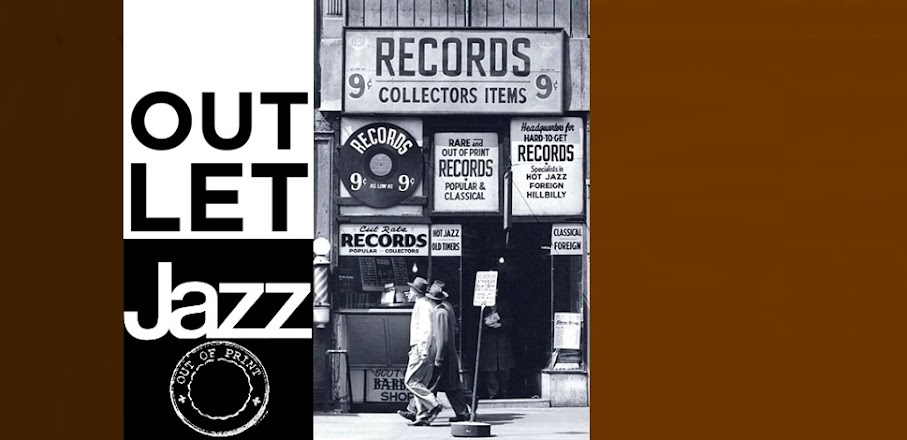Sahib Shihab born Edmund Gregory in Savannah, Georgia, on June 23, 1925. Though his musical career stretched over four decades, Sahib Shihab counted only about a dozen titles as leader, including this 1964 recording made with a handful of members of the Clarke Boland Big Band in Cologne, engineered by their regular engineer Wolfgang Hirschmann. How and why the title came to be released only in the US through Chicago based Chess Jazz subsidiary Argo label is anyone's guess. Shihab's other occasional label connections included Savoy, Debut, Storyville and Atlantic.
Shihab spent from 1960 to 1986 as a resident of Europe, including a decade 1963-72 a regular fixture of the Clarke Boland Big Band. He returned to the US for his final years, passing away in 1989 age 64.
The stripped-down Shihab — Clarke Boland Quintet is a marvel of musical mobility, big band in everything but... size. All the compositions and arrangements here enjoy a small big-band flavour, the power toned down, a bit more intimate, but unmistakably Clarke Boland, embracing a wider range of styles: waltz, rhumba, more European stuff.
Shihab is one of the most original voices of the baritone sax. With a reference bar of Harry Carney, Gerry Mulligan, Lars Gullin and Pepper Adams, Shihab developed a unique vocabulary which owes little or nothing to those players, he simply charted his own course. Changing from baritone, his alto solo on the selection "Please Don't Leave Me" is quirky, straying fancifully, before finally locking onto the groove and picking up speed. But not until Åke Persson and Francy Boland have shown their mettle.
"Waltz For Seth" is another Shihab favourite, and other tracks ("Herr Fixit", "Campi's Idea") point back to jazz producer / supervisor Gigi Campi: "busy, eloquent, creative intellectual, Pietro Luigi (Gigi) Campi — editor, architect, concert manager, music publisher, producer and restaurateur", and anchor of the Cologne jazz scene. Campi productions have found their way to the Italian reissue label Schema/Rearward, of which I have many CBBB, Johnny Griffin and Sahib Shihab titles. *londonjazzcollector.wordpress.com*
A fantastic early record by Sahib Shihab — a motherlode of modal jazz grooves, cut during the early days of the Clarke-Boland Big Band! The record features a core group of players from that ensemble — including Shihab on alto, baritone, and flute, plus Francy Boland on piano, Jimmy Woode on bass, Åke Persson on trombone, Francy Boland on piano, Joe Harris on bongos, and Kenny Clarke on drums — all coming together here with a groove that's really groundbreaking — a style that's sweet and soulful, but rhythmically revolutionary too! The tracks are all long and grooving — with the kind of dancing jazz tone that you'd expect from the Saba/MPS label during the mid 60s — a big change from the Argo label that originally issued the record. But that's no surprise, either, as the session was actually recorded in Europe by Gigi Campi — the man behind the CBBB albums on MPS — with a feel that's quite similar to other Shihab classics, like Companionship or Seeds. The whole thing's great — one of Shihab's most wonderful records, and totally worth owning. *dustygroove.com*
There is one moment... when the darkness of the night begins to pass... when first light creeps from horizon through the leaves of the trees, 'round the corners of your neighbor's house... it sneaks through the windows softening the colors on its way, altering your feelings of past and present, banishing all those many troubles...
Listen! The sounds seems transparent... they echo... they come again... and now from over there...
You smell the cool breeze, touching heart and brain, rebuilding your ego, helpin to strip off the troublesome yesterday...
You're alone. It is summer dawn... *Nat Jungnick (liner notes)*
1 - Lillemor
2 - Please Don't Leave Me
3 - Waltz For Seth
4 - Campi's Idea
5 - Herr Fixit
(All compositions by Sahib Shihab)
Sahib Shihab (alto sax, baritone sax, flute), Åke Persson (trombone), Francy Boland (piano), Jimmy Woode (bass), Joe Harris (bongos), Kenny Clarke (drums).
Recorded in Cologne, Germany, May 8 and 9, 1963.
***
and now... a break and some days for my own summer dawns...
Best New Year for all here!












